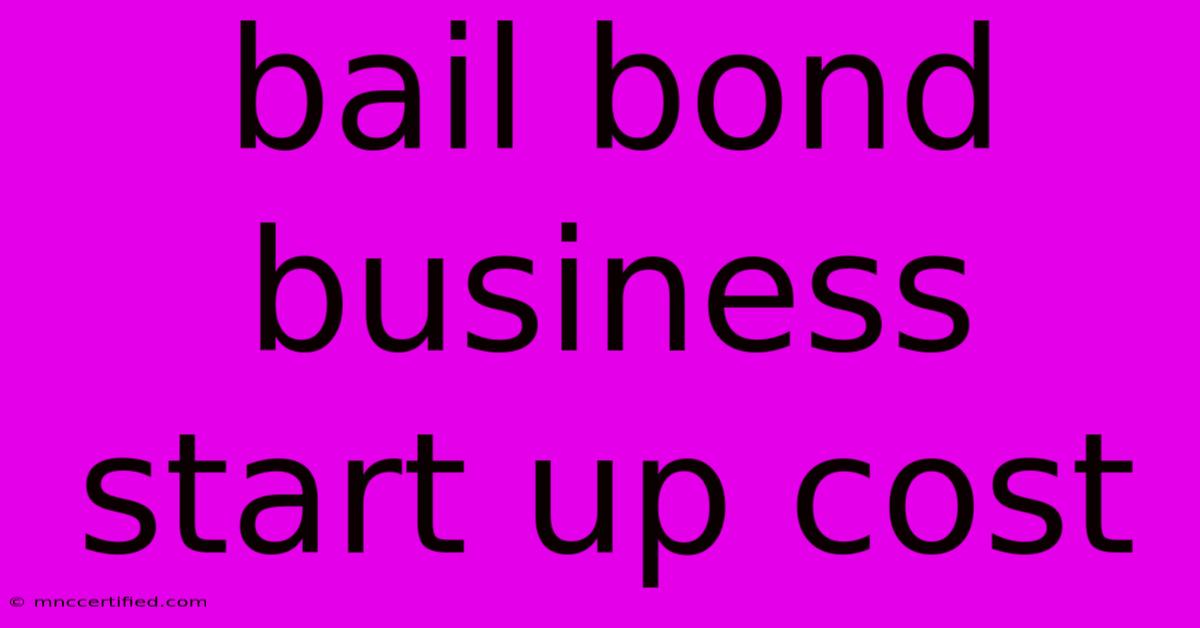Bail Bond Business Start Up Cost

Table of Contents
Bail Bond Business Startup Costs: A Comprehensive Guide
Starting a bail bond business can be lucrative, but it requires significant upfront investment. Understanding the startup costs is crucial for securing funding and creating a realistic business plan. This comprehensive guide breaks down the essential expenses involved in launching your bail bond agency. We'll cover everything from licensing and bonding to marketing and operational costs, helping you create a detailed budget and navigate the financial landscape of this unique industry.
Essential Startup Costs: A Detailed Breakdown
The costs associated with starting a bail bond business vary significantly depending on location, business size, and chosen business model. However, certain expenses remain consistent across most ventures. Let's examine them in detail:
1. Licensing and Bonding: The Foundation of Your Business
This is arguably the most significant initial investment. Costs vary dramatically by state and even county.
- Surety Bond: This is a substantial expense. The amount required differs significantly based on your location and the level of risk your business presents. Expect to pay a premium for the bond, which is typically a percentage of the bond amount. Research your state's requirements thoroughly.
- Licensing Fees: State and local licensing fees are mandatory. These fees cover background checks, application processing, and other regulatory compliance procedures. Be sure to factor in potential renewal costs.
- Professional Fees (Legal & Accounting): You'll need legal counsel to navigate the complex regulations surrounding bail bonds. An accountant can help with setting up your business structure, managing finances, and ensuring tax compliance.
2. Operational Costs: Running Your Day-to-Day Operations
Running a bail bond agency demands ongoing operational expenses. These include:
- Office Space: Renting office space is crucial for client meetings, paperwork, and storing essential documents. The cost depends on location and size. Consider virtual office options to minimize initial investment.
- Technology & Software: Investing in reliable computers, software for managing client information, communication systems (phones and internet), and potentially a bail bond software solution is crucial for efficiency and compliance.
- Insurance: In addition to the surety bond, general liability insurance is essential to protect your business against potential lawsuits or accidents.
- Marketing and Advertising: Getting your name out there requires a marketing strategy. This includes online advertising (PPC, SEO), print advertising (local newspapers, flyers), and potentially networking within the legal community.
- Transportation: You or your employees will likely need reliable transportation for visiting clients, courts, and jails. Consider vehicle costs, maintenance, and insurance.
- Staffing: Depending on the scale of your operation, you might need to hire employees for various roles (e.g., bail agents, administrative staff). Consider salaries, benefits, and payroll taxes.
- Legal & Compliance Costs (Ongoing): Ongoing legal and compliance costs are essential to stay up-to-date with changing regulations and ensure your business operates within legal parameters.
3. Contingencies and Unexpected Expenses
Always account for unforeseen expenses when creating your budget:
- Legal Disputes: Be prepared for potential legal challenges or disputes with clients or other parties.
- Economic Downturns: Economic conditions can impact your business. Having a financial reserve can help you weather potential downturns.
- Technological Upgrades: Keeping your technology up-to-date is crucial. Budget for software updates, hardware replacements, and potential cybersecurity measures.
Minimizing Startup Costs: Strategies for Success
While starting a bail bond business requires significant investment, you can employ strategies to minimize costs:
- Start Small: Begin with a smaller-scale operation and gradually expand as your business grows.
- Virtual Office: Utilize a virtual office to reduce overhead costs associated with renting physical space.
- Strategic Marketing: Focus your marketing efforts on cost-effective strategies such as SEO and targeted online advertising.
- Negotiate Rates: Negotiate with vendors and suppliers to secure favorable rates for services and supplies.
- Seek Funding: Explore funding options such as small business loans or investors to secure the necessary capital.
Conclusion: Planning for Success in the Bail Bond Industry
Starting a bail bond business is a significant undertaking, requiring careful planning and financial management. By thoroughly researching the costs involved, developing a detailed budget, and implementing cost-saving strategies, you can increase your chances of success in this competitive industry. Remember to consult with legal and financial professionals throughout the process to ensure compliance and optimize your financial strategy. Thorough planning and a realistic understanding of the financial landscape are essential for launching a profitable and sustainable bail bond agency.

Thank you for visiting our website wich cover about Bail Bond Business Start Up Cost. We hope the information provided has been useful to you. Feel free to contact us if you have any questions or need further assistance. See you next time and dont miss to bookmark.
Featured Posts
-
Brazil Vs Uruguay 2026 World Cup Qualifiers
Nov 20, 2024
-
Request For Investment Redemption
Nov 20, 2024
-
Taylor Detchon Fisher Investments
Nov 20, 2024
-
Northwest And Ethical Investments
Nov 20, 2024
-
Two Bears Trading Post Ruidoso Nm
Nov 20, 2024